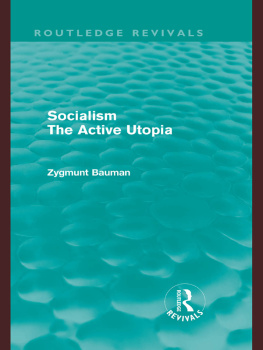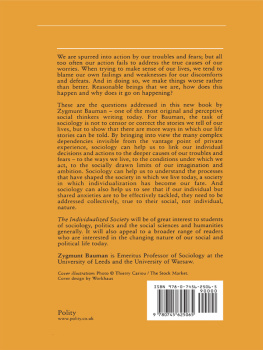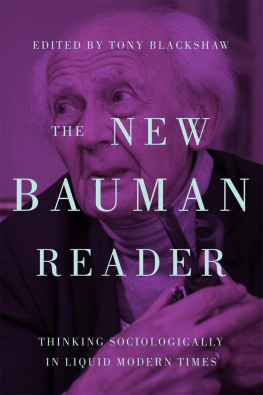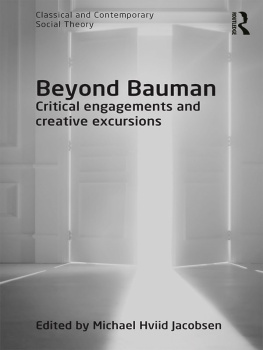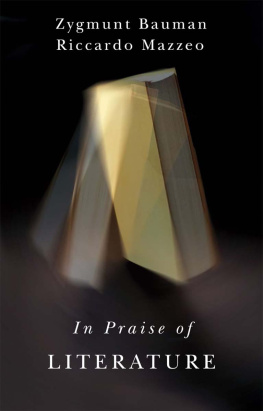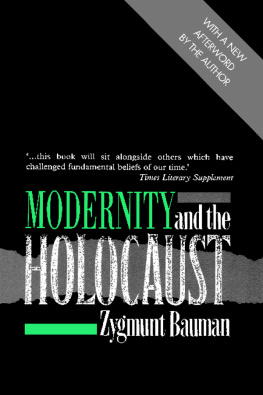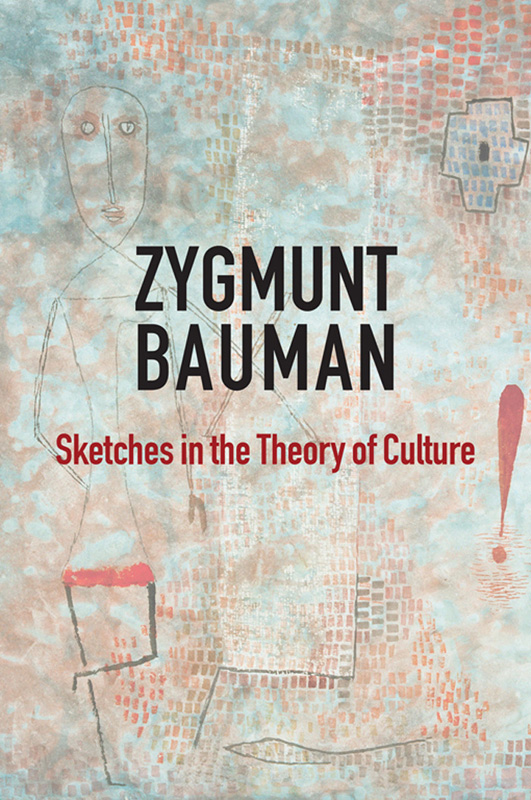Table of Contents
List of figures
Guide
Pages
Sketches in the Theory of Culture
Zygmunt Bauman
Edited by Dariusz Brzeziski
Translated by Katarzyna Bartoszyska
polity
First published in Polish as Szkice z teorii kultury by Wydawnictwo Naukowe Scholar, Warsaw, 2016
This English edition copyright Zygmunt Bauman, 2018
Polity Press
65 Bridge Street
Cambridge CB2 1UR, UK
Polity Press
101 Station Landing
Suite 300
Medford, MA 02155, USA
All rights reserved. Except for the quotation of short passages for the purpose of criticism and review, no part of this publication may be reproduced, stored in a retrieval system or transmitted, in any form or by any means, electronic, mechanical, photocopying, recording, or otherwise, without the prior permission of the publisher.
ISBN-13: 978-1-5095-2829-5
ISBN-13: 978-1-5095-2830-1 (pb)
A catalogue record for this book is available from the British Library.
Library of Congress Cataloging-in-Publication Data
Names: Bauman, Zygmunt, 1925-2017, author.
Title: Sketches in the theory of culture / Zygmunt Bauman.
Other titles: Szkice z teorii kultury. English
Description: English edition. | Medford, MA : Polity, 2018. | Includes bibliographical references and index.
Identifiers: LCCN 2018006738 (print) | LCCN 2018033005 (ebook) | ISBN 9781509528332 (Epub) | ISBN 9781509528295 (hardback) | ISBN 9781509528301 (pbk.)
Subjects: LCSH: Culture. | Semiotics. | Social structure.
Classification: LCC HM621 (ebook) | LCC HM621 .B388 2018 (print) | DDC 306dc23
LC record available at https://lccn.loc.gov/2018006738
Typeset in 11 on 13 pt Sabon
by Toppan Best-set Premedia Limited
Printed and bound in Great Britain by CPI Group (UK) Ltd, Croydon
This research was funded by the National Science Centre in Poland on the basis of the grant awarded after obtaining a doctoral degree, based on the decision No DEC-2014/12/S/HS2/00391.
The publisher has used its best endeavours to ensure that the URLs for external websites referred to in this book are correct and active at the time of going to press. However, the publisher has no responsibility for the websites and can make no guarantee that a site will remain live or that the content is or will remain appropriate.
Every effort has been made to trace all copyright holders, but if any have been inadvertently overlooked the publisher will be pleased to include any necessary credits in any subsequent reprint or edition.
For further information on Polity, visit our website:
politybooks.com
A Message in a Bottle: on the Recovered Work of Zygmunt Bauman
Dariusz Brzeziski
Introduction
: 200, 201). Meanwhile like a message in a bottle, coursing the ocean it managed to survive in one, incomplete set of proofs. They were recently found, and, thanks to studies undertaken, it was possible to reconstruct the entire text of the work.
Sketches in the Theory of Culture is remarkable both because of its history, and because of the value of the ideas presented within it. In the book were articles devoted to theoretical reflection sensu stricto, and to issues such as: the condition of mass culture, the demands of pedagogy, changes in rural regions, etc. In his analysis, the author referred to studies undertaken in various fields, creating an interdisciplinary discourse that comprises the signum specificum of his work even today (Tester 2001: 7, 8). On the one hand, this work can be read as an examination of the transformations that were taking place in the social sciences during the 1960s. A lot of space was devoted to the crisis of cultural anthropology and to the potential of structuralism and cybernetics. Bauman penetratingly and critically analysed developing currents, and presented his own, very interesting propositions as part of his studies of culture. On the other hand, the book contained reflections on the birth of a new type of society, characterized, among other things, by a greater dose of individualization, the intensification of a global network of relationships, and incredibly quick, impossible-to-predict transformations. The sociologist wrote about the world of the second half of the last century under the rubric of liquidity and amorphousness, thus anticipating his later thoughts on the transformation of modernity by a few decades (Bauman 2000).
The following text is devoted to acquainting readers with the message in a bottle that is the Sketches in the Theory of Culture, and also indicating its value for the reader of today. In the first part, I will present the circumstances of finding the work and the steps that were taken to reconstruct it. Next, I will move to the time when the book was written; I will describe some events from the intellectual biography of Bauman that are important to this context, and will sketch out the context of the socio-cultural events in Poland during the year of 1968. The following two portions of the text will be devoted to the contents of Sketches in the Theory of Culture. First, I will describe the problematic of particular chapters, and then I will point to the evolution in Bauman's view of culture, which is clearly visible in this text. I will conclude by presenting the messages for the present that can be found in this work, which was written half a century ago, and recently, fortunately, washed up on the shore.
The History of the Preserved Copy and the Reconstruction of the Text of the Book
The documents collected in the editor's files for Sketches in the Theory of Culture assisted in the reconstruction of the text, and also shed light on the history of its creation and the attempts to destroy it.
). First, he went to Israel, where he worked at a university in Tel Aviv. Then from 1971 until his retirement he was the director of the Institute of Sociology at the University of Leeds in Great Britain.
Efforts to preserve the one copy of Sketches in the Theory of Culture should be considered in light of the above-mentioned facts. This required, no doubt, both bravery and a conviction of the value of this text. Today, we can only suppose such a hypothesis was proposed by Janusz Siek in a conversation with me that an employee of the Ossolineum Publishing House, wanting to save the book, passed on a preserved fragment of the proofs (in the form of so-called galleys) to the then-director of the libraries named above, Janusz Krajewski. He had the text bound, and hid it in a place from which he could retrieve it in more welcoming times. But he did not live to see those times.
Interventions undertaken during the editorial process were based on making changes to the text that were indicated in the editorial proofs, unifying the citations, and introducing minor typographical changes stemming from the evolution of Polish grammar.
Sketches in the Theory of Culture in the Context of Bauman's Earlier Work
). The worsening of the situation in Poland during the following years confirmed his belief in the illusory nature of those expectations and placed him in the position of being an ever greater critic of political leaders. This had consequences for both his political views and his academic work.
). He had very limited opportunities to present these views in publications, however. His first wife Janina remembered the difficulties he encountered in the second half of the 1960s, years later, in the following way:



